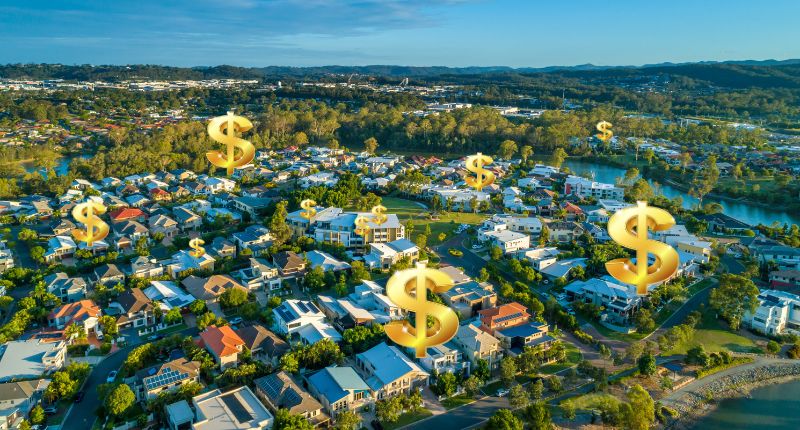
- The housing market comprises multiple sub-markets.
- Performance of each sub-market will vary, as such, the adage of doubling Australian home prices every seven to ten years may not necessarily apply.
- Drivers for property price growth include scarcity, desirability, location, or size/type.
Australia’s property market is not just one real estate market. Every state has its own property market, which is made up of many smaller property markets – down to each suburb.
Even then, within each suburb, different streets may perform vastly differently – consider how competitive it is to buy in a suburb’s best street versus its worst street.
All these different property markets will work on different property cycles, so it is difficult to place an umbrella statement over all the property markets and make a general statement that Australian home prices are increasing every year, even though it really feels that way.
Do Australian property prices double every 10 years?
The track record behind property investing has shown property values will typically double every 7-10 years.
Reiterating the above: Australia does not have one property market but is made up of many markets. Therefore, house prices doubling across a decade is largely a generalisation on the overall value of property because it is based on Australian Bureau of Statistics (ABS) records over time.
This means that some properties will outperform these statistics whilst others may underperform these statistics. That’s just how the mathematics behind averages work.
Some properties that are purchased in the right markets will double in value over this timeframe, but not all properties will perform like this. That is why importance should be placed on acquiring an ‘investment grade property’ that is well located and has the right characteristics for the demographics of the area.
What is an investment grade property?
An investment grade property ultimately means a property with attributes that allow for wealth creation such as scarcity, desirability, location, affordability, or size/type.
In comparison to other properties, investment grade properties will have a greater potential for capital growth.
What makes an investment grade property?
Approximately 20% of Australian households own an investment property, but not all these properties allow for wealth creation. An investment grade property should have the following attributes:
Potential for capital growth
The capital growth of a property will ultimately create wealth. Look for properties in areas that have the potential for capital growth and are not at the peak of their cycle. These areas will have multiple growth drivers (such as multiple industries for employment), as well as new schools, hospitals and shopping precincts.
Also look at government spending on infrastructure such as new roads, highways, bridges or even sporting stadiums. All these infrastructure improvements will increase the liveability of the area and the desirability for migration into the location which will ultimately push the demand higher than supply and create the capital growth you are looking for.
Scarcity
You want your property to stand out so that it is worth more when it comes time to re-value or sell. This is because you want the demand for your property to outweigh the supply which will result in getting the top dollar for your property. For this reason, look to buy apartments in smaller complexes and steer away from houses in housing developments that often have ‘cookie cutter’ houses.
Properties located in areas where land is scarce will make a good investment and push the prices up.
Convenience
Look for properties that are in good proximity to local amenities and transport.
Access to public transport, schools, shops, and restaurants as well as located on a quiet leafy street away from the busy roads will make your property more appealing to potential tenants or future buyers.
Quality
Look at the property’s individual features and ensure you are paying the right price for the quality of the asset you are purchasing. It is okay to buy a ‘renovator’s dream’, but ensure you pay the right price and are not paying a similar amount to a neighbouring property that already has all the top specs, as this will only limit the profit to be made on the property.
Gearing
For an investment grade property, you would need to ensure the gearing of the property is right for your strategy.
Positively geared properties will essentially pay for themselves and you should not need to be contributing your own hard-earned cash to cover the costs of holding the property.
Negative gearing can be the right strategy for some investors who are targeting strong capital growth only – for example, properties in the middle of capital cities are likely to be negatively geared but will have excellent returns in the long term – so it is important that you purchase a property that has the right gearing strategy for you.
~~
This article seeks to provide general information only. See our Terms of Use.




